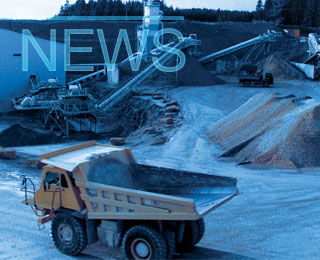Despite recent news reports of political tension in Egypt, there are some positive signs in the country's cement market that demand is recovering after two difficult years. The latest figures indicate that last year cement demand expanded by around five per cent, just surpassing the 51Mt mark, a growth rate not seen since 2009. In 2011, consumption fell 1.7 per cent to 48.69Mt while prices contracted 10 per cent.
During these the past two years, the entry of new companies has provided new stimulus to the industry. El-Arish Cement saw its market share jump from 1.1 per cent in 2011 to 5.3 per cent one year later. In addition, Arabian Cement (Group Cementos La Union) also noted a significant increase in its market share, up from 6.6 per cent to 8.8 per cent while El-Sewedi Cement booked a 2.1 percentage point advance to 4.8 per cent. These gains have come predominantly at the expense of market leaders Suez Cement (Ciments Francais) and Lafarge Egypt. Suez Cement saw its market share drop from 20.2 per cent to 18 per cent. Lafarge Egypt's share contracted from 16.3 per cent to 15.2 per cent, according to CM-CIC Securities.
The loss in market share of key producers was compounded by temporary difficulties in gas supplies. Bedouin attacks on pipelines feeding the Vicat kilns resulted in security-related downtime for the company, which experienced a 33 per cent drop in 4Q12 sales volumes to 542,000t and reducing its market share to 4.4 per cent (from 6.5 per cent) as it sold only 2.051Mt of cement in 2012.
Nevertheless, during the third quarter, the situation eased on the back of a much-improved August and September performance. A pick-up in exports, likely to Sudan and Libya, has also assisted utilisation rates, particularly for Misr Beni Suef (ASEC), Lafarge and Ciments Francais.
However, the issue of fuel costs has not disappeared. The industry has needed to adjust to the introduction of gas allocation quotas and the end of fuel subsidies. The government plans to raise the price of natural gas to US$6/mmBtu, a 33 per cent increase, and the Ministry of Trade and Industry announced on 20 January 2013 that it would increase the price of heavy fuel oil for the cement and ceramics industries by 50 per cent to US$225/t. While the industry has recognised the need to cut fuel subsidies, it calls for a more gradual reduction so cement makers can adapt to the new landscape.
This further reduction in gas subsidies, combined with sharp rises in electricity bills, also renders the Egyptian market vulnerable to price hikes as cement producers prepare to offset the resultant contraction of profit margins with a rise in sales prices. While prices were at a low of EGP422/t (US$63) in 2011, more recently prices have firmed up at EGP510/t (US$76).
Despite the adjustment required from the industry, it appears that Egyptian cement makers can look forward to an improved business climate going forward. Development and housing needs by Egypt's burgeoning population are expected to ensure an expansion in the country's future.

Cement demand contracting sharply in USA
Weak business and consumer confidence, amid economic uncertainty, is weighing heavily on demand ...